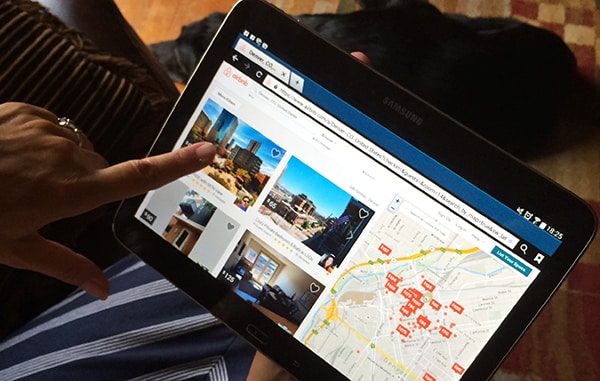
Visitors spent about $30 million to stay at homes listed by companies like Airbnb and VRBO around Denver this summer, according to data provided by the city. (BusinessDen file)
Short-term rentals made a comeback during their peak season between May and August this year after a dramatic downturn in 2020 due to COVID-19.
Visitors spent about $30 million to stay at homes listed by companies like Airbnb and VRBO around Denver, according to data provided by the city. During the summer of 2020 — when the pandemic forced hosts to cancel bookings — visitors spent a little more than $10 million.
“We are seeing that Denver’s demand is still well below 2019 levels, still in recovery, but it’s doing much better than a lot of the other major cities in the U.S.,” said Jamie Lane, vice president of research at the short-term rental data company AirDNA, which is based in Denver.
People spent more than $35 million to stay at homes during the summer of 2019.
Lane said Denver’s short-term rental bookings are about 20 to 25 percent below the levels they were prior to the pandemic, but larger cities like Los Angeles and Houston have remained at about 50 percent below.
Denver’s average nightly rate at short-term rentals was as high as $187 in July, according to AirDNA. Lane said people are spending more at properties to get nicer rooms with more features and they are staying longer.
Larger homes with more rooms have been booking at much higher rates in recent months than smaller apartment or condominium units near and around downtown and business districts, Lane said.
“If someone’s going to make a trip, they’re much more likely to book one with other amenities with a larger outdoor space, pet-friendly, have a pool, all those things because they … at least over the past 18 months have been spending more time at the property,” Lane said.
Denver collected $34.9 million in lodgers’ tax from all types of overnight accommodations, including hotels and motels, for the entire year of 2019 and just $13.4 million in 2020. This year it is expected to collect $21.4 million, according to the city’s most recent budget proposal.
Denver’s lodger’s tax rate is 10.75 percent for lodging facilities with fewer than 50 rooms and 11.75 percent for those with more than 50.
The number of active licenses for short-term rentals was higher than 2,700 in August 2019, but after the pandemic hit in 2020 they dropped to a three-year low of 1,875 in January of this year. There were 2,055 active licenses at the end of August this year.
Collection of lodger’s taxes from short-term rentals in 2020 started off with a high of a little more than $1 million in February, but by May of that year they had fallen to less than $43,000.

Visitors spent about $30 million to stay at homes listed by companies like Airbnb and VRBO around Denver this summer, according to data provided by the city. (BusinessDen file)
Short-term rentals made a comeback during their peak season between May and August this year after a dramatic downturn in 2020 due to COVID-19.
Visitors spent about $30 million to stay at homes listed by companies like Airbnb and VRBO around Denver, according to data provided by the city. During the summer of 2020 — when the pandemic forced hosts to cancel bookings — visitors spent a little more than $10 million.
“We are seeing that Denver’s demand is still well below 2019 levels, still in recovery, but it’s doing much better than a lot of the other major cities in the U.S.,” said Jamie Lane, vice president of research at the short-term rental data company AirDNA, which is based in Denver.
People spent more than $35 million to stay at homes during the summer of 2019.
Lane said Denver’s short-term rental bookings are about 20 to 25 percent below the levels they were prior to the pandemic, but larger cities like Los Angeles and Houston have remained at about 50 percent below.
Denver’s average nightly rate at short-term rentals was as high as $187 in July, according to AirDNA. Lane said people are spending more at properties to get nicer rooms with more features and they are staying longer.
Larger homes with more rooms have been booking at much higher rates in recent months than smaller apartment or condominium units near and around downtown and business districts, Lane said.
“If someone’s going to make a trip, they’re much more likely to book one with other amenities with a larger outdoor space, pet-friendly, have a pool, all those things because they … at least over the past 18 months have been spending more time at the property,” Lane said.
Denver collected $34.9 million in lodgers’ tax from all types of overnight accommodations, including hotels and motels, for the entire year of 2019 and just $13.4 million in 2020. This year it is expected to collect $21.4 million, according to the city’s most recent budget proposal.
Denver’s lodger’s tax rate is 10.75 percent for lodging facilities with fewer than 50 rooms and 11.75 percent for those with more than 50.
The number of active licenses for short-term rentals was higher than 2,700 in August 2019, but after the pandemic hit in 2020 they dropped to a three-year low of 1,875 in January of this year. There were 2,055 active licenses at the end of August this year.
Collection of lodger’s taxes from short-term rentals in 2020 started off with a high of a little more than $1 million in February, but by May of that year they had fallen to less than $43,000.
